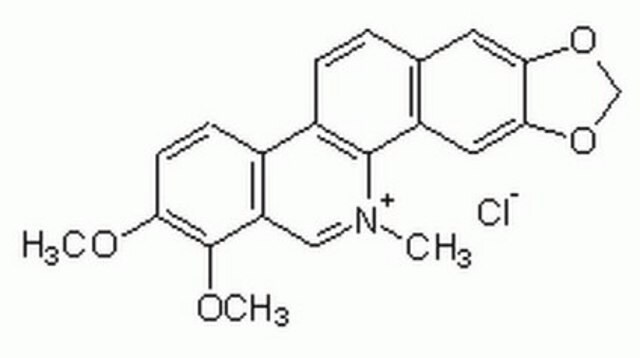208725
Calphostin C, Cladosporium cladosporioides
A cell permeable, highly specific inhibitor of protein kinase C (IC₅₀ = 50 nM) that interacts with the protein′s regulatory domain by competing at the binding site of diacylglycerol and phorbol esters.
Sinónimos:
Calphostin C, Cladosporium cladosporioides, UCN-1028c
About This Item
Productos recomendados
Quality Level
assay
≥95% (HPLC)
form
lyophilized solid
manufacturer/tradename
Calbiochem®
storage condition
OK to freeze
protect from light
color
light brown
solubility
DMSO: 1 mg/mL
ethanol: soluble
shipped in
ambient
storage temp.
2-8°C
InChI
1S/C44H38O14/c1-20(56-43(50)22-10-8-7-9-11-22)16-25-31-32-26(17-21(2)57-44(51)58-24-14-12-23(45)13-15-24)42(55-6)40(49)34-28(47)19-30(53-4)36(38(32)34)35-29(52-3)18-27(46)33(37(31)35)39(48)41(25)54-5/h7-15,18-21,45,48-49H,16-17H2,1-6H3
InChI key
LSUTUUOITDQYNO-UHFFFAOYSA-N
General description
Biochem/physiol Actions
PKC
Warning
Reconstitution
Other Notes
Svetlov, S., and Nigami, S. 1993. Biochim. Biophys. Acta 1177, 75.
Gopalakrishna, R., et al. 1992. FEBS Lett. 314, 149.
Shimamato, H., et al. 1992. Br. J. Pharmacol.107, 282.
Bruns, R.F., et al. 1991. Biochem. Biophys. Res. Commun.176, 288.
Tamaoki, T., et al. 1990. Biotechnology8, 732.
Kobayashi, E., et al. 1989. Biochem. Biophys. Res. Commun.159, 548.
Legal Information
Storage Class
11 - Combustible Solids
wgk_germany
WGK 3
flash_point_f
Not applicable
flash_point_c
Not applicable
Certificados de análisis (COA)
Busque Certificados de análisis (COA) introduciendo el número de lote del producto. Los números de lote se encuentran en la etiqueta del producto después de las palabras «Lot» o «Batch»
¿Ya tiene este producto?
Encuentre la documentación para los productos que ha comprado recientemente en la Biblioteca de documentos.
Nuestro equipo de científicos tiene experiencia en todas las áreas de investigación: Ciencias de la vida, Ciencia de los materiales, Síntesis química, Cromatografía, Analítica y muchas otras.
Póngase en contacto con el Servicio técnico